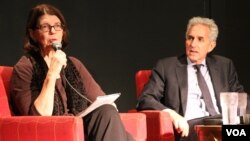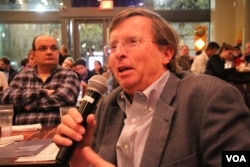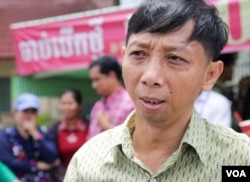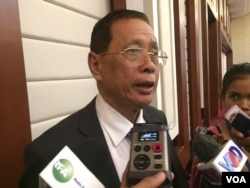Cambodia's wealthy elite is increasingly buying media outlets, according to a joint Media Ownership Monitor (MOM) project by Reporters without Borders and the Cambodian Center for Independent Media. Among 27 owners surveyed in the project, nine are business and political tycoons and 10 are politically affiliated.
Experts say these media owners are keen to protect their interests and the interests of the government which protects them — at the expense of providing news to citizens.
In Cambodia, many media owners are tycoons, or oknha in Khmer, the primary language. The king confers this title once a person contributes $100,000 to a so-called social development cause. As of 2012, approximately 2.66 million of Cambodia's 15.9 million people lived on less than $1.20 per day, and the estimated per capita income was $3,700, according to the CIA World Factbook.
"If [the tycoons] are involved in politics, then I would say it even gets more problematic," Charles Davidson, executive director of Kleptocracy Initiative at Hudson Institute, told VOA Khmer. He spoke to VOA in a phone interview after a recent event in the Kleptocracy and Democracy Debate Series, held in Washington.
"So, I would say that's a danger and it's a worldwide trend," Davidson said.
The control of media by wealthy elites in developing countries and democracies in transition is a worrying trend, which could potentially lead to danger, according to media experts in the United States.
Conflicts of interest
The wealthy who own media outlets have many other financial interests, and there are often obvious — and subtle — conflicts of interests. The result can be a media environment that bows to power rather than speaking truth to it, as is the best practice in many developed democracies, according to experts.
"If the power gets concentrated in one country with no democratic traditions and no good journalistic traditions, and there is one guy who comes out on top, and there is not any competition any more, then I think there is a very dangerous situation," said Martha Bayles, media professor at Boston College in Massachusetts, in an interview with VOA at the Washington event.
The trend toward a concentration of media ownership in developing democracies is emerging as the media worldwide — especially the independent and critical outlets in developed democracies — come under attack by politicians and the powerful for reporting facts that negatively touch on the business or political interests of the elite.
Last week, in response to perceived media attacks on the Trump administration, Stephen Bannon, the president's chief White House strategist, told The New York Times that "The media here is the opposition party."
In Cambodia, Pa Nguon Teang, the executive director of the Cambodian Center for Independent Media, said when media ownership is concentrated among the wealthy elite, it will lead to a government less accountable to the people it is supposed to serve.
"Those working in the media controlled by tycoons or big business people under the political influence from the ruling party and the government, dare not voice their other opinions contrary to the political line already set by their media outlets," he told VOA. "So, this makes a loss to independent viewpoints needed by Cambodian people."
Or, as Davidson put it, "The media is going to be under the government control entirely, and anybody who is practicing journalism outside of that control is essentially a dissident."
Accusations against Hun Sen
Critics say the Cambodian government led by Hun Sen, one of Asia's longest-serving prime ministers, has been attempting to control or influence the media through various means, either by having family members own media outlets or suppressing those independent voices critical of his government and his more than 30-year rule.
Cambodia has more than 100 radio stations, dozens of television stations and more than 400 newspapers in operation within the country, according to the government figures. Most of the media outlets are owned, controlled or run by the ruling elites. Critics often say such outlets devote most of their broadcast time to entertainment programs rather than news, in part as a way to take people's attention away from government or ruling-class businesses.
Jeff Gedmin, a former president of VOA-affiliated Radio Free Europe/Radio Liberty and a senior research fellow at Georgetown University, told VOA Khmer at the debate that "we want to inform the people, too, in a responsible way.
"You can't have good decisions unless you have good facts," he said, adding, "All of us, whether you are Cambodian or American."
Government response
Phay Siphan, a Cambodian government spokesman, said authorities do not control any media outlets except the only state-run National Radio of Kampuchea (RNK) and National Television of Kampuchea (TVK).
"All have freedom of speech and are free to broadcast anything because they are private media," he said in a phone interview. "The state does not provide funds like the ones received by Voice of America and Radio Free Asia. In this country, the media survive by themselves."
Likewise, Sok Eysan, a spokesman of the ruling Cambodian People's Party, which has been in power since 1979, said each media outlet owner is the person who decides what to broadcast without getting any orders from the government or the party.
"The prime minister has never threatened a general director of any radio or TV station to broadcast his activities. Whether they want to broadcast them or not is up to each of them," he said.
"If we determine that you have to write about or broadcast this or that, for example broadcast only boxing and not any concerts, then that's not possible," Eysan added. "It depends on the producer of the program to make sure they have all sorts of entertainments in all art forms."







